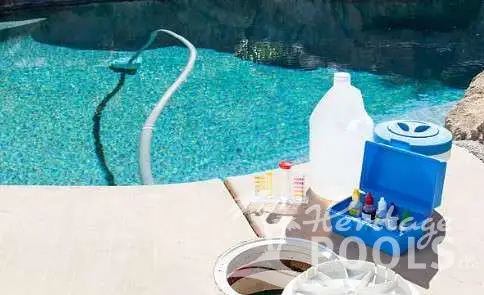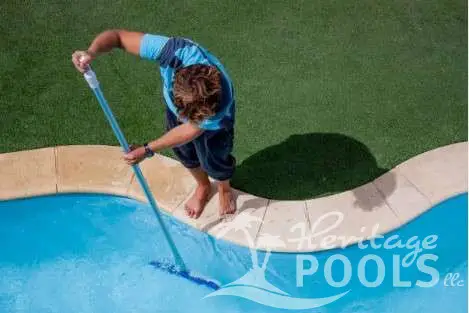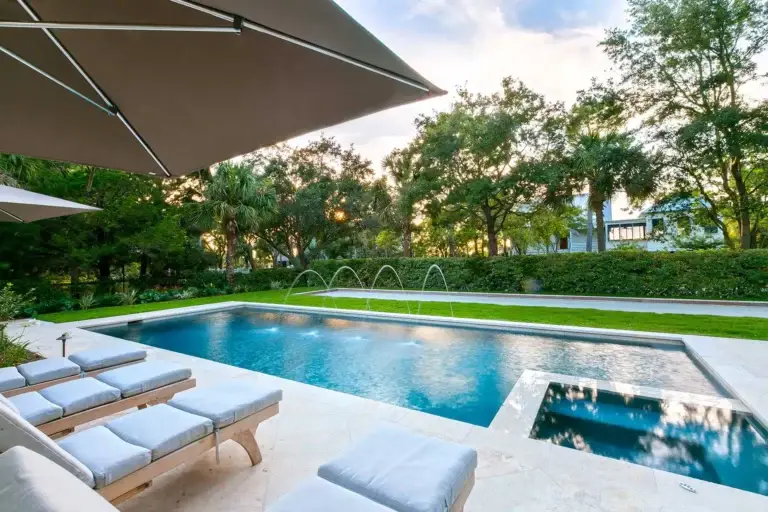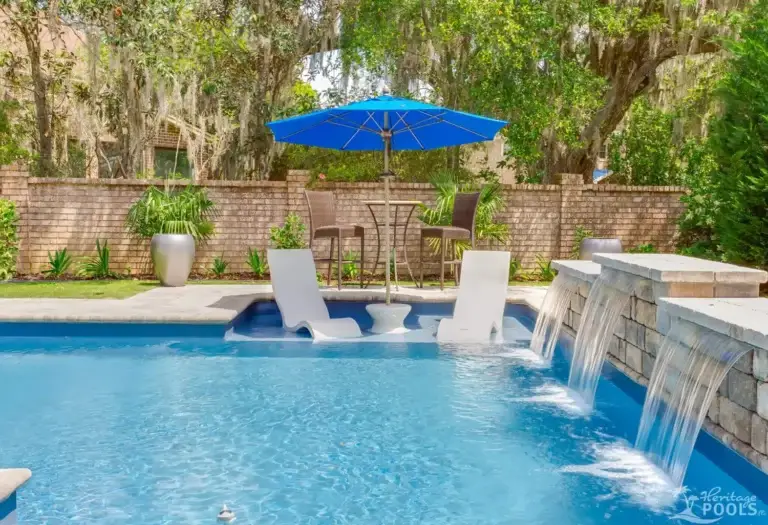If you own a swimming pool, then you know that proper maintenance is crucial to ensure the safety and enjoyment of swimmers. One of the biggest challenges that pool owners face is the growth of black algae in their swimming pools though.
Black algae are known for their stubbornness and resistance to most pool chemicals, making them a significant concern for pool owners. If left untreated, black algae can cause unsightly discoloration and staining on your pool’s walls and surfaces, as well as pose a health risk to swimmers.
Fortunately, there are several powerful ways to eliminate black algae from your pool.
In this blog post, we will explore five effective strategies that can help you get rid of black algae and keep your pool sparkling clean. From chemical treatments to manual scrubbing, we will cover everything you need to know to get rid of black pool algae, and prevent it from coming back.
So if you’re struggling with black algae in your pool, read on to discover five powerful ways to first recognize black algae, eliminate it and enjoy a healthy and inviting swimming environment.
Table of Contents
1. Pool Maintenance
Regular pool maintenance is essential for preventing black algae growth. Here are some maintenance tips to keep in mind:
As pool industry specialists, we have seen firsthand the damage that black algae can do to a swimming pool. Not only can it cause unsightly discoloration and staining of pool surface, but it can also be harmful to swimmers’ health. Black algae are notoriously difficult to remove once they take hold, making prevention the best course of action.
One of the most effective ways to prevent black algae growth is by regularly brushing your pool. Using a stiff-bristled brush, you should scrub the walls, floor, and accessories in your pool at least once a week. This will help prevent the buildup of organic matter, which is a prime breeding ground for black algae. It’s also essential to ensure that you are brushing thoroughly enough to dislodge any black algae that may already be present.
Maintaining proper water balance is also crucial to preventing black algae growth. You should test your pool water regularly and adjust the pH, alkalinity, and chlorine levels as needed. Proper water balance will help keep your water healthy and balanced, making it less hospitable to black algae.
A high-quality pool filter is another essential tool for keeping your pool free of black algae. The filter will help remove organic matter and other debris from your pool, reducing the likelihood of black algae growth. It’s important to clean or replace your filter regularly to ensure optimal performance.
In addition to brushing and maintaining water balance and a good pool filter, it’s essential to keep your own pool equipment clean and accessories clean. Items such as ladders, skimmers, pool toys, and other pool equipment can harbor black algae. Be sure to clean them regularly to prevent algae growth.
If you do find black algae in your pool, it’s important to take immediate action. Black algae are very difficult to remove, but there are specialized algaecides and shock treatments that can help. You should scrub the pool surfaces and affected area with a stiff-bristled brush to dislodge the algae and increase the effectiveness of the treatment.
Preventing black algae growth requires a combination of regular maintenance and attention to detail. By regularly brushing your pool, maintaining proper water balance, using a high-quality pool filter, and keeping your pool accessories clean, you can help prevent black algae from taking hold in your pool.
2. Water Balance
Maintaining proper water balance is essential for preventing black algae in your swimming pool. Here are some tips to keep your water balanced:
- Test Your Water Regularly: Test your pool water at least once a week to ensure that your water is properly balanced. Use a pool test kit to check the pH, alkalinity, and chlorine levels.
- Adjust pH Levels: If your pH level is too high or too low, it can create an environment that’s conducive to black algae growth. Use a pH increaser or decreaser to adjust your pH levels as needed.
- Maintain Proper Alkalinity Levels: Alkalinity is a measure of your pool water’s ability to resist changes in pH. Keep your alkalinity levels between 80 and 120 ppm to prevent black algae growth.
- Chlorine Levels: Chlorine is essential for killing black algae. Maintain your chlorine levels between 1-3 ppm to keep your pool water free of black algae.

3. Using Algaecides
Algaecides are chemicals that kill algae and prevent it from growing. Here are some tips for using algaecides to prevent black algae growth:
- Choose the Right Algaecide: Make sure to choose an algaecide that specifically targets black algae. Look for products that contain copper or silver.
- Follow Instructions Carefully: Always follow the instructions on the algaecide label carefully. Overusing an algaecide can be harmful to your pool and can lead to other issues.
- Use Algaecide as a Preventative Measure: Using algaecide regularly can help prevent black algae growth in your pool.

4. Treating Black Algae
If black algae has already taken hold in your pool, here are some tips for effective treatment:
- Brush Your Pool: Brush the affected areas of your pool thoroughly to remove as much of the black algae as possible.
- Shock Treatment: Shock treatment involves adding a large amount of chlorine to your pool water to kill black algae. Follow the instructions on the shock treatment product carefully and take appropriate safety measures when using it.
- Use Algaecide: Follow the instructions on the algaecide label to treat black algae. Black algae can be more stubborn than other types of algae, so you may need to use an algaecide specifically formulated to treat black algae.
Pro Note: Black algae forms roots in the pool plaster. Brushing the affected area exposes the roots of the algae, which allows the shock to penetrate the deep roots within the pool walls and kill the algae.
Black algae can be a stubborn and frustrating problem for pool owners, but it’s not impossible to prevent or treat. By following the tips and best practices outlined in this article, you can keep your pool clean and free of black algae.
Remember to maintain proper water balance, use algaecides as a preventative measure, and take appropriate safety measures when treating black algae. With a little diligence and effort, you can keep those black algae spots out of your pool all year long.
FAQs
Is it OK to swim with black algae?
No. It is best to completely eliminate blue-green/black algae in your pool to ensure safety for swimmers.
What does black algae mean in a pool?
Black algae is typically caused by bad chlorination or high phosphate levels.




